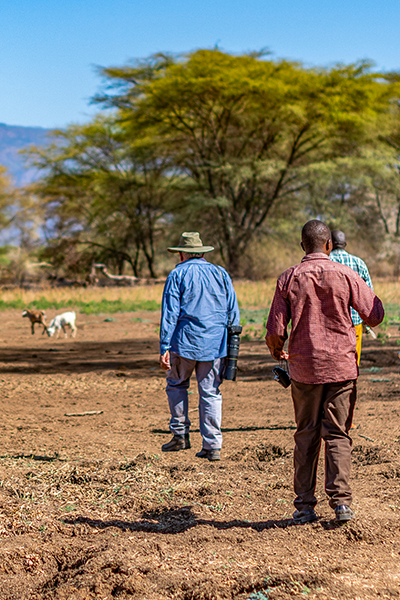Countries:
Kenya
Status:
Completed
Sector:
Nature
Promoting nature-based solutions for land restoration while strengthening the national restoration monitoring technical working group to tackle widespread land degradation in Kenya.
In Kenya, forest and landscape restoration (FLR) efforts have largely been fragmented, hindering credible tracking and reporting on restoration and climate-related commitments. In addition, contextual and gender equality and social inclusion (GESI) considerations are rarely applied in restoration initiatives.
This project focused on identifying and implementing context-appropriate and gender responsive restoration options in Makueni county for upscaling to other counties. It also aimed to strengthen capacity of stakeholders in the use of Gender Transformative approaches (GTA) for land restoration, and establish a national landscape restoration monitoring technical working group (TWG). The TWG aims to enable the country to develop a credible national landscape monitoring and reporting system on FLR and climate-related commitments. The TWG formed through the project will continue to be pivotal in supporting coordinated tracking, assessment, learning and reporting of restoration-related commitments for Kenya.
Key project outcomes included formation and operationalisation of the TWG, leading to the development of an integrated monitoring and reporting framework and a trend analysis report synthesising 47 county engagements. In addition, the project developed an Options by Context (OxC) guide (English and Kiswahili versions), Gender InfoBrief and videos on nature-based solutions and GTA. The project increased stakeholder capacity for monitoring and reporting on FLR, uptake and scaling of context-appropriate and gender-transformative restoration approaches, policy influencing and sustained action on climate change.
This project was delivered by ICRAF. The project collaborated with several international organisations and national agencies to form the Landscape Restoration Monitoring TWG.
"I applaud the many actors drawn from various sectors involved in the consultation processes and development of the framework for integrated monitoring of Forest and Landscape Restoration."
Julius Kamau
Chief Conservator of Forests, Kenya Forest Service

This multi-stakeholder TWG formed through the project by Ministry of Environment and Forestry supported the finalisation of the Forest and Landscape Restoration Implementation Plan 2022-26
FOLAREP and FLR Monitoring Framework will guide actors in tracking progress and reporting national restoration targets, and enable actors to better assess restorative efforts
Proposed restoration monitoring indicators for Kenya alongside draft FOLAREP. The indicators were subjected to participatory county engagement workshops in 47 counties
Data from the past Dryland Restoration Project was analysed and validated through a co-design workshop to develop a OxC approach guide
The project carried out an analysis of Options by Context (OxC) based on collation and analyses of datasets under the past IFAD-EC Dryland Restoration Project to identify an initial set of restoration options, with specific attention to their gender and social dimensions. Insights from the analysis were presented and validated through a co-design workshop, informing the development of OxC matrices on restoration practices. Key outputs included:
people reached through multi-stakeholder workshops to identify imbalances in workloads and decision-making power within households
people trained as trainers of trainers (ToTs) on the use of ‘community dialogues’ – a gender transformative approach for land restoration
community members in Kalawa/Mako and Mbooni East sub-counties participated in ToT organised training
informative knowledge products developed to promote Gender Transformative Approaches and to ensure that GESI is included in future restoration efforts
The project promoted the GTA to ensure that GESI priorities are embedded in future restoration efforts, alongside lessons for long-term sustainability and wider scaling of results. This was delivered through a series of multi-stakeholder workshops reaching over 300 counterparts across Mbooni East and Kibwezi East sub-counties, with outputs including:
The project also encouraged ToTs to organise into groups, adapt activities and design their own training events. For example, groups of ToTs in Kalawa/Mako, Mbooni East held training events with minimal support from the project, reaching 56 community members. The lessons learnt, particularly from the OxC and reflective workshop on GTA, significantly contributed to the production of a wide range of knowledge products aimed at increasing awareness, capacity, and scaling of context-appropriate and gender-transformative restoration approaches in Makueni County and beyond. These include an OxC approach field guide in English and Kiswahili, a Gender InfoBrief, and two videos.

The project identified key recommendations for stakeholders involved in land restoration:
Lessons from the multi-stakeholder co-design gender-transformative approach for land restoration by the project
View PDFAn illustrative five-step guide to applying the Options by Context approach to land restoration
View PDFUK PACT (Partnering for Accelerated Climate Transitions) is a unique capacity-building programme. Jointly governed and funded by the UK Government’s Foreign, Commonwealth and Development Office (FCDO) and the Department for Energy Security and Net Zero (DESNZ) through the UK's International Climate Finance, it works in partnership with countries with high emissions reduction potential to support them to implement and increase their ambitions for tackling climate change.
© Copyright 2025 UK PACT Privacy Notice Cookie Policy